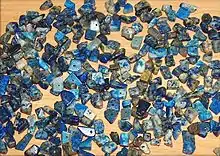asur
English
Noun
asur (plural asurs)
- (India, Hinduism) Alternative spelling of Asura.
- (India, derogatory) An evil person.
- 2021, Snigdhenu Bhattacharya, The Wire:
- This use of the word to portray the Bengal chief minister as the biggest challenger to the country’s two most powerful men, and especially their depiction as an asur or demon, did not go down well with supporters of the country’s ruling force, the Bharatiya Janta Party (BJP).
Galician

asur
References
- “asur” in Dicionario de Dicionarios da lingua galega, SLI - ILGA 2006–2013.
Iban
Ladino
Antonyms
Further reading
- Aitor García Moreno, editor (2013–), “asur”, in Diccionario Histórico Judeoespañol (in Spanish), CSIC
- Joseph Nehama, Jesús Cantera (1977) “asúr”, in Dictionnaire du Judéo-Espagnol (in French), Madrid: CSIC, →ISBN, page 64
- Elli Kohen & Dahlia Kohen-Gordon (2000) “asur”, in Ladino–English Concise Encyclopedic Dictionary, Hippocrene Books, →ISBN, page 47
Welsh
Etymology
Borrowed from Middle English asure, from Old French azur, in turn borrowed from Arabic لَازَوَرْد (lāzaward), borrowed from Persian لاجورد (lâjvard).
Pronunciation
- (North Wales) IPA(key): /ˈasɨ̞r/
- (South Wales) IPA(key): /ˈasɪr/
- Rhymes: -asɨ̞r
Derived terms
- asurfaen (“lapis lazuli”)
Mutation
| Welsh mutation | |||
|---|---|---|---|
| radical | soft | nasal | h-prothesis |
| asur | unchanged | unchanged | hasur |
| Note: Some of these forms may be hypothetical. Not every possible mutated form of every word actually occurs. | |||
See also
| gwyn | llwyd | du |
| coch; rhudd | oren, melyngoch; brown | melyn; melynwyn |
| melynwyrdd | gwyrdd | |
| gwyrddlas; glaswyrdd | asur, gwynlas | glas |
| fioled, rhuddlas; indigo | majenta; porffor | pinc, rhuddwyn |
References
- R. J. Thomas, G. A. Bevan, P. J. Donovan, A. Hawke et al., editors (1950–present), “asur”, in Geiriadur Prifysgol Cymru Online (in Welsh), University of Wales Centre for Advanced Welsh & Celtic Studies
This article is issued from Wiktionary. The text is licensed under Creative Commons - Attribution - Sharealike. Additional terms may apply for the media files.